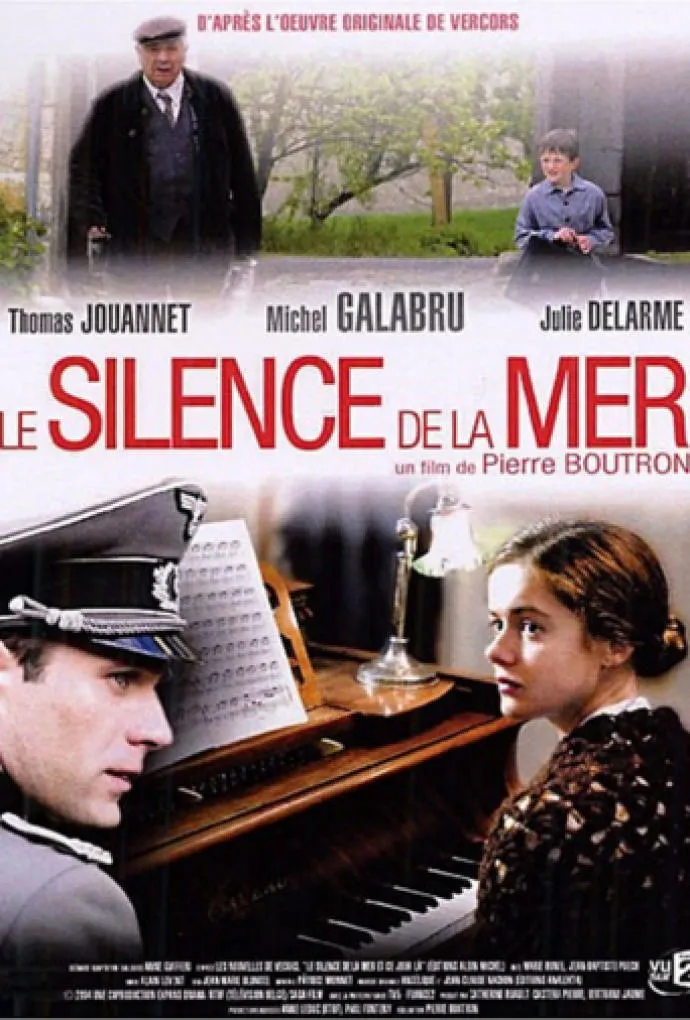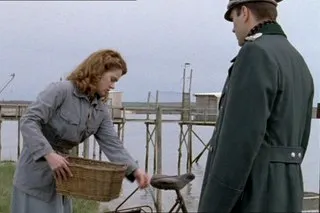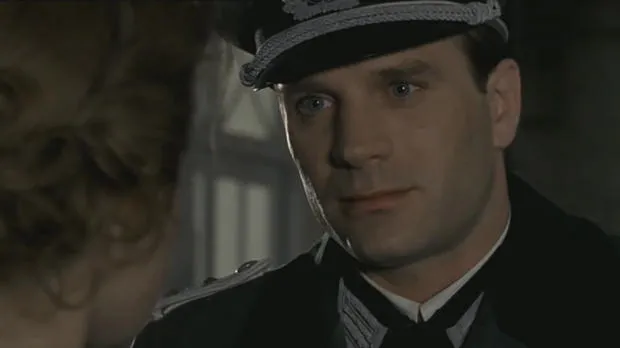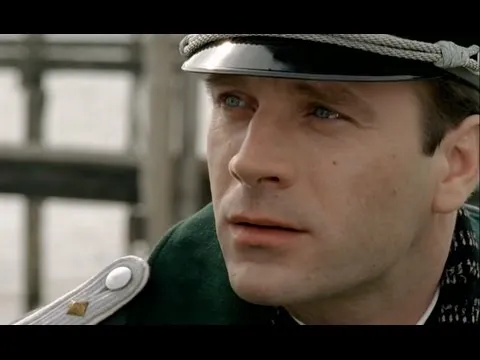
One aspect I like about European and Latin American cinema is that their style of filmmaking is mostly subject to cinematic realism, with stories that are adapted to the reality of the country of origin of the film, unlike American cinema, which has a more fictional feel to it. And this time I am talking about this French feature film titled in its original language as "Le Silence de la Mer", translated as The Silence of the Sea. Remake released in 2004, inspired by the first version of the same title, but released in 1947, under the direction of Jean-Pierre MELVILLE and inspired by the novel by Jean BRULLER, published in 1942.
This film is centred in a context of history, during the Second World War, when the Nazis in 1941, had occupied France, and in some village of this country, live a young girl named Jeanne and her grandfather André, in what seemed to have a life completely calm in spite of the war in course.
Jeanne, who stands out as a wonderful pianist, works every day giving piano lessons to a little girl, while her grandfather takes care of the house and her care. One day a Nazi soldier arrives, notifying André and Jeanne that a high-ranking soldier is coming to stay in their house, because they know that they live alone and have rooms available, an idea that was distasteful to André and Jeanne, who already had a grudge against the Germans for everything related to the war and their invasion.
Un aspecto me gusta del cine europeo y latinoamericano, es que mayormente su estilo de hacer cine, esta sujeto en realismo cinematográfico, con historias que se adaptan a la realidad del país origen de la película, a diferencia del cine estadounidense, que si tiene un sentido más hacia ficción. Y en ésta ocasión les hablo sobre éste largometraje francés titulado en su idioma original como "Le Silence de la Mer", traducido como El Silencio del Mar. Remake estrenado en 2004, inspirado por la primera versión del mismo título, pero estrenado en 1947, bajo la dirección de Jean-Pierre MELVILLE e inspirado por la novela de Jean BRULLER, publicado en 1942.
Éste film se centra dentro de un contexto de la historia, durante la Segunda Guerra Mundial, momento cuando los nazis en 1941, tenían ocupado Francia, y en algún pueblo de dicho país, viven una joven de nombre Jeanne y su abuelo André, en lo que parecía tener una vida complentamente tranquila a pesar de guerra en curso.
Jeanne, quien se destaca como una maravillosa pianista, trabaja todos los días dando lecciones de piano a una niña, mientras que su abuelo se encarga de estar en la casa y su cuido. Un día llega un soldado nazi, notificando al señor André y Jeanne, sobre el hecho de que un militar de alto rango, se viene a hospedar en la casa de ellos, porque ellos saben que viven solos y tienen habitaciones disponibles, idea que fue de mal gusto para André y Jeanne, quienes de por sí, tenían rencor hacía los alemanes, por todo lo relacionado a la guerra y la invasión de parte de ellos.

Without any complaints, Jeanne and André had to accept in silence that they had to host the Nazi soldier, until the day came when Captain Werner showed up. With a polite attitude he introduced himself to Jeanne and André, but they only kept silent because of the presence of the Nazi captain. Every day the captain said his goodbyes and arrived at the house politely, but still the hosts ignored him completely.
More than a year went by, and Jeanne began to feel a certain appreciation and even a growing fondness for Werner, as did Werner himself for Jeanne, so that he even tried to get closer, telling certain stories about his life, his way of thinking, his admiration for French culture and also his skill as a musician, an aspect that he related a lot to Jeanne.
It is there, in a way, that Jeanne, listening to the captain every day, falls in love with him, but remains reluctant to talk to him. On the other hand, this behaviour is noticed by her grandfather, but he prefers not to talk about it with his granddaughter.
Sin reclamos algunos, Jeanne y André tuvieron que aceptar en silencio, de que tenían que hospedar al militar nazi, hasta que llega el día, cuando se presenta eo capitán Werner, con una actitud educada se presentó ante Jeanne y André, pero ellos sólo guardar silencio por la presencia del capitán nazi. Cada día el capitán se despedía y hacía su llegada a la casa amablemente, pero aún así los anfitriones, lo ignoraban por completo.
Llegando a pasar hasta más de 1 año, y Jeanne comienza a sentir cierto aprecio y hasta de enermorarse de Werner, al igual que el mismo Werner hacia Jeanne, por lo que él incluso trata de tener un mayor acercamiento, relatando ciertas historias de su vida, su manera de pensar, su admiración por la cultura francesa y también su habilidad como músico, aspecto que se relaciona mucho co Jeanne.
Es ahí, en cierta manera donde Jeanne, escuchando todos los días al capitán, se enamora de él, pero sigue siendo necia ante la idea de hablarle. Por otra parte ese comportamiento lo nota el abuelo, pero prefiere no tocar ese tema a su nieta.

The denouement of the film is determined when, one night, Captain Werner was in a meeting with other Nazi officers. Jeanne notices that a person puts a bomb under Werner's car, and it is here that Jeanne becomes very distressed and does not know what to do, until it is daylight and she realises that both the Nazi officers and Werner must leave, and it is then that Jeanne starts to play the piano, Even though she had promised never to play it while Werner was at home, the captain was impressed and wanted to stay a little longer, until an explosion sounded, no doubt a way for Jeanne to distract Werner, so that he wouldn't die in the attack and to show that she did care for him.
Although the Nazis later took Jeanne's neighbours, who left a small son in her care, prisoner and perhaps shot, Jeanne's neighbours. Therefore Jeanne insists with Werner to free her neighbours, but everything is frustrated. And then comes the final point, when Captain Werner has to go to the eastern front, and it is here that Jeanne breaks the silence and says goodbye to him.
In this way, the film was understood, where the most elementary thing was the body language, basically with this aspect, one can denote the feelings of the characters and what they want to express, of that subtle and sublime love, between the main characters of Jeanne and Werner.
El desenlace de la película, se determina cuando una noche, cuando el capitán Werner, estaba reunido con otros oficiales nazis. Jeanne nota que una persona pone una bomba de bajo del carro de Werner, y es aquí cuando Jeanne se angustia mucho y no sabe qué hacer, hasta que se hace de día y si da de cuenta que ya tanto los oficiales nazis y Werner, se deben ir, y es ahí cuando Jeanne se pone a tocar el piano, aun así cuando había prometido nunca tocarlo mientras estaba Werner en casa, de esta manera el capitán se impresionó y quiso quedarse un rato más, hasta que suena una explosión, sin duda era una manera de Jeanne de distraer a Werner, para que no muriera en ese atentado y mostrar que sí le tenía afecto.
Aunque luego los nazis, se llevaran preso y quizás fusilados, a los vecinos de Jeanne, quienes dejaron un pequeño hijo a cargo de ella. Por lo tanto Jeanne insiste con Werner, para que liberen a sus vecinos, pero todo se frustró. Y llega el punto final, cuando el capitán Werner se tiene que ir al frente oriental, y es aquí donde Jeanne rompe el silencio y se despedirse de él.
De ésta forma, se comprendió la película, donde lo más elemental fue el lenguaje corporal, básicamente co éste aspecto, uno puede denotar los sentimientos de los personajes y de lo que quieren expresar, de ese amor tan sútil y sublime, entre los personajes principales de Jeanne y Werner.


